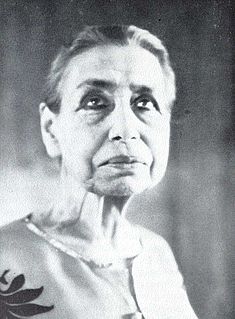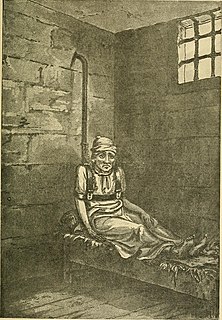In philosophy, idealism is the group of metaphysical philosophies that assert that reality, or reality as humans can know it, is fundamentally mental, mentally constructed, or otherwise immaterial. Epistemologically, idealism manifests as a skepticism about the possibility of knowing any mind-independent thing. In contrast to materialism, idealism asserts the primacy of consciousness as the origin and prerequisite of material phenomena. According to this view, consciousness exists before and is the pre-condition of material existence. Consciousness creates and determines the material and not vice versa. Idealism believes consciousness and mind to be the origin of the material world and aims to explain the existing world according to these principles.
Psychosomatic medicine is an interdisciplinary medical field exploring the relationships among social, psychological, and behavioral factors on bodily processes and quality of life in humans and animals.

The id, ego, and super-ego are three distinct, yet interacting agents in the psychic apparatus defined in Sigmund Freud's structural model of the psyche.
Solipsism is the philosophical idea that only one's mind is sure to exist. As an epistemological position, solipsism holds that knowledge of anything outside one's own mind is unsure; the external world and other minds cannot be known and might not exist outside the mind. As a metaphysical position, solipsism goes further to the conclusion that the world and other minds do not exist. This extreme position is claimed to be irrefutable, as the solipsist believes themselves to be the only true authority, all others being creations of their own mind.

Subjective idealism, or empirical idealism, is the monistic metaphysical doctrine that only minds and mental contents exist. It entails and is generally identified or associated with immaterialism, the doctrine that material things do not exist. Subjective idealism rejects dualism, neutral monism, and materialism; indeed, it is the contrary of eliminative materialism, the doctrine that all or some classes of mental phenomena do not exist, but are sheer illusions.
Vritti, literally "whirlpool", is a technical term in yoga meant to indicate that the contents of mental awareness are disturbances in the medium of consciousness. Vritti can be taken as a catch-all term for any content in consciousness, where consciousness is regarded as a medium or container for any possible mental content. The scope of the idea is very broad, referring not only to thoughts and perceptions experienced in a normal waking state, but also to all super-physical perceptions, such as dreams or in any altered state of consciousness. Vritti has also been translated as "waves" or "ripples" of disturbance upon the otherwise calm waters of the mind. The classical definition of yoga as stated in the Yoga Sutras is to calm the waves and return, or reunite mind to its calm state, or samadhi.
Dissociation is any of a wide array of experiences from mild detachment from immediate surroundings to more severe detachment from physical and emotional experiences. The major characteristic of all dissociative phenomena involves a detachment from reality, rather than a loss of reality as in psychosis.

In philosophy, panpsychism is the view that mind or a mind-like aspect is a fundamental and ubiquitous feature of reality. It has taken on a wide variety of forms. Contemporary academic proponents hold that sentience or subjective experience is ubiquitous, while distancing these qualities from complex human mental attributes; they ascribe a primitive form of mentality to entities at the fundamental level of physics but do not ascribe it to most aggregates, such as rocks or buildings. On the other hand, some historical theorists ascribed attributes like life or spirits to all entities.

Object relations theory in psychoanalytic psychology is the process of developing a psyche in relation to others in the environment during childhood. It designates theories or aspects of theories that are concerned with the exploration of relationships between real and external people as well as internal images and the relations found in them. It also maintains that it is the infant's relationship with the mother that primarily determines the formation of his personality in his adult life. Particularly, the need for attachment is the bedrock of the development of the self or the psychic organization that creates the sense of identity.
A comfort object, transitional object, or security blanket is an item used to provide psychological comfort, especially in unusual or unique situations, or at bedtime for children. Among toddlers, comfort objects may take the form of a blanket, a stuffed animal, or a favorite toy, and may be referred to by nicknames.

Integral yoga, also called supramental yoga, is the yoga-based philosophy and practice of Sri Aurobindo and The Mother. Integral yoga finds all life conscious or subconscious a yoga, defines the term yoga as a methodised effort towards self-perfection by the expression of the secret potentialities latent in the being and highest condition of victory in that effort - a union of the human individual with the universal and transcendent existence which is seen partially as expressions in humans and in the cosmos. As a yoga idea, that Spirit manifests itself in a process of involution. The reverse process of evolution is driven toward a complete manifestation of spirit.
Metaphysical solipsism is the variety of idealism which asserts that nothing exists externally to this one mind, and since this mind is the whole of reality then the "external world" was never anything more than an idea. It can also be expressed by the assertion "there is nothing external to these present experiences", in other words, no reality exists beyond whatever is presently being sensed. The aforementioned definition of solipsism entails the non-existence of anything presently unperceived including the external world, causation, other minds, the past or future, and a subject of experience. Despite their ontological non-existence, these entities may nonetheless be said to "exist" as useful descriptions of the various experiences and thoughts that constitute 'this' mind. The solipsistic self is described by Wittgenstein in the Tractatus: "The self of solipsism shrinks to a point without extension and there remains the reality co-ordinated with it".

Peter Fonagy, is a Hungarian-born British psychoanalyst and clinical psychologist. He studied clinical psychology at University College London. He is Professor of Contemporary Psychoanalysis and Developmental Science and Head of the Division of Psychology and Language Sciences at University College London, Chief Executive of the Anna Freud Centre, a training and supervising analyst in the British Psycho-Analytical Society in child and adult analysis, a Fellow of the British Academy, the Faculty of Medical Sciences, the Academy of Social Sciences and a registrant of the BPC. His clinical interests centre on issues of borderline psychopathology, violence and early attachment relationships. His work attempts to integrate empirical research with psychoanalytic theory. He has published over 500 papers, 270 chapters and has authored 19 and edited 17 books.
Narcissistic mortification is "the primitive terror of self dissolution, triggered by the sudden exposure of one's sense of a defective self ... it is death by embarrassment". Narcissistic mortification is a term first used by Sigmund Freud in his last book, Moses and Monotheism, with respect to early injuries to the ego/self. The concept has been widely employed in ego psychology and also contributed to the roots of self psychology.
This is a glossary of terms used in New Thought.

Pratyabhijna is an idealistic monistic and theistic school of philosophy in Kashmir Shaivism, originating in the 9th century CE. The term Trika was used by Abhinavagupta to represent the entire Kashmir Shaivism or to designate the Pratyabhijna system.
Bizarre object in object relations theory is the name given to external objects which, by way of projective identification, are imbued with characteristics of the subject's own personality.
Trauma-sensitive yoga is modern yoga, based on the postures called asanas, adapted from 2002 onwards for work with individuals affected by psychological trauma. The goal of trauma-sensitive yoga is for trauma survivors to develop a greater sense of mind-body connection, ease their physiological experiences of trauma, gain a greater sense of ownership over their bodies, and augment their overall well-being.
Symbolic equation is the term used in Kleinian psychoanalysis for states of thinking which equate current objects with those of the past, rather than finding a resemblance between the two sets.





